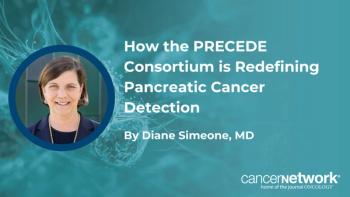
Role of Biomarkers in Selection of Patients with Prostate Cancer for Focal Therapy Currently Unclear
A clear and reliable biomarker to select patients with prostate cancer for active surveillance or focal therapy has not yet been determined but inferring a course of action from existing biomarkers may be possible.
The role of biomarkers in patient selection for focal therapy is not yet defined, and studies are needed to determine the utility of various tests for this specific population of patients with prostate cancer, according to a presentation given at the 21st Annual Meeting for the Society of Urologic Oncology.
The presentation, given by Mohummad Minhaj Siddiqui, MD, Director of Urologic Oncology at the University of Maryland Medical System, also noted that biomarkers may be useful to the decision-making process of both patients and physicians.
“In select clinical scenarios, biomarkers may hold significant benefit to guide patients and physicians in decision making,” said Siddiqui.
When looking for possible biomarkers to aid in patient selection, Siddiqui looked at 2 distinct groups of biomarkers – those used in the identification of occult clinically significant prostate cancer, and those used in the identification of occult biological potential within tumors.
In terms of the localization of occult clinically significant prostate cancer, Siddiqui pointed to serum markers such as the prostate health index (PHI) and the OPKO Health 4K test as prostate specific antigen (PSA) derivatives useful in identifying the presence of group grade 2 or higher prostate cancer, as well as urine markers such as SelectMDx as possible candidates for a useful biomarker.
“All 3 of them really kind of end up having these similar outputs in terms of predictive value for grade group 2 or higher prostate cancer,” noted Siddiqui.
A fourth biomarker, and the most promising according to Siddiqui was the tissue marker, ConfirmMDx.
“This I think has the most promise, because it’s done on biopsies,” remarked Siddiqui. “One potential application is in a patient where you have a region that you don’t plan on treating, but you have biopsies from that region…you could see if the methylation pattern in the vicinities of those biopsies demonstrates the potential for a regional cancer of significance.”
For characterization of occult biological significance, Siddiqui pointed to 3 main tests currently in widespread use – the Prolaris test, which shows prostate cancer specific mortality, OncotypeDx Prostate, which demonstrates pathology, and Decipher, which gives prediction of high-grade disease, 5-year metastasis, and 10-year prostate cancer specific mortality.
“How you integrate [those] into deciding on focal therapy is still up in the air, but these are the outputs, and they may be of utility,” concluded Siddiqui.
Reference:
Siddiqui MM. Use of biomarkers to Select Patients for Active Surveillance and Focal Ablation. Presented at: 21st Annual Meeting of the Society of Urologic Oncology; December 4, 2020.
Newsletter
Stay up to date on recent advances in the multidisciplinary approach to cancer.





































